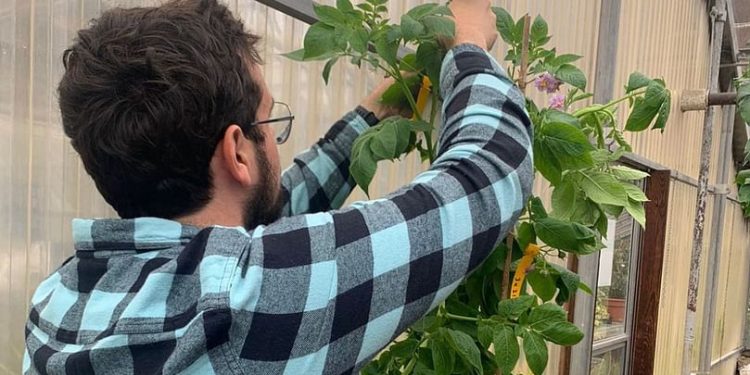#PotatoBreeding #ClimateResilience #DNAScience #AgriculturalInnovation #MainePotatoes #SustainableFarming
In the heart of Maine’s changing climate, the University of Maine’s potato breeding program, now spearheaded by Mario Andrade, is embracing DNA science to ensure the stability and profitability of the state’s No. 1 food crop. As climate extremes wreak havoc on crops, the need for innovative solutions becomes paramount.
Andrade, who took over the program from Gregory Porter in 2023, emphasizes the unpredictability of the coming years. With Maine experiencing shifts towards warmer and wetter conditions, the potato breeding program becomes instrumental in addressing these challenges.
The collaboration between Andrade and Porter aims to create new potato strains that can withstand not only bugs and diseases but also the unpredictable weather. Andrade’s experience in Brazil and Florida provides a diverse perspective, crucial for adapting strategies to Maine’s unique conditions.
The narrow harvest window in Maine poses a distinct challenge, requiring efficient farming practices to avoid frost damage. Andrade acknowledges the technological prowess of Maine’s farmers and their ability to manage challenging soil conditions.
To enhance potato performance, UMaine conducts tests in different locations, including Florida and South Carolina. The data collected post-harvest allows researchers to identify plants that best tolerate specific climate nuances in each region.
A groundbreaking development in the program is the integration of DNA science. Extracting DNA from plant leaf samples expedites the breeding process, potentially reducing the time it takes to release a new variety by two to three years. With DNA information from nearly 1,000 potato plants, Andrade aims to predict the best-performing varieties for the upcoming year.
Excitingly, the Aroostook Farm secures a $1.4 million grant from the United States Department of Agriculture to develop climate-resistant potato varieties. This funding will renovate the phenotyping lab, introducing automatic graders and sorters to enhance research efficiency and produce higher quality potatoes.
Despite challenges, the potato breeding program’s future looks promising, thanks to support from U.S. Sen. Susan Collins, the Maine Potato Board, Potatoes USA, and the Department of Agriculture. This financial backing ensures the farm’s security through 2025.
As Andrade immerses himself in the potato industry and experiences the kindness of Maine’s residents, the impact of the breeding program extends beyond state borders. Maine’s Caribou Russet and the Lamoka variety, engineered with UMaine’s assistance, demonstrate the program’s influence, reaching the 12th and top 10 most planted potatoes in the U.S., respectively.
The integration of DNA science into the University of Maine’s potato breeding program marks a significant leap forward in creating climate-resilient potato varieties. With ongoing projects and financial support, the program is well-positioned to tackle the challenges posed by Maine’s changing climate, ensuring a stable and profitable future for the state’s vital potato industry.







